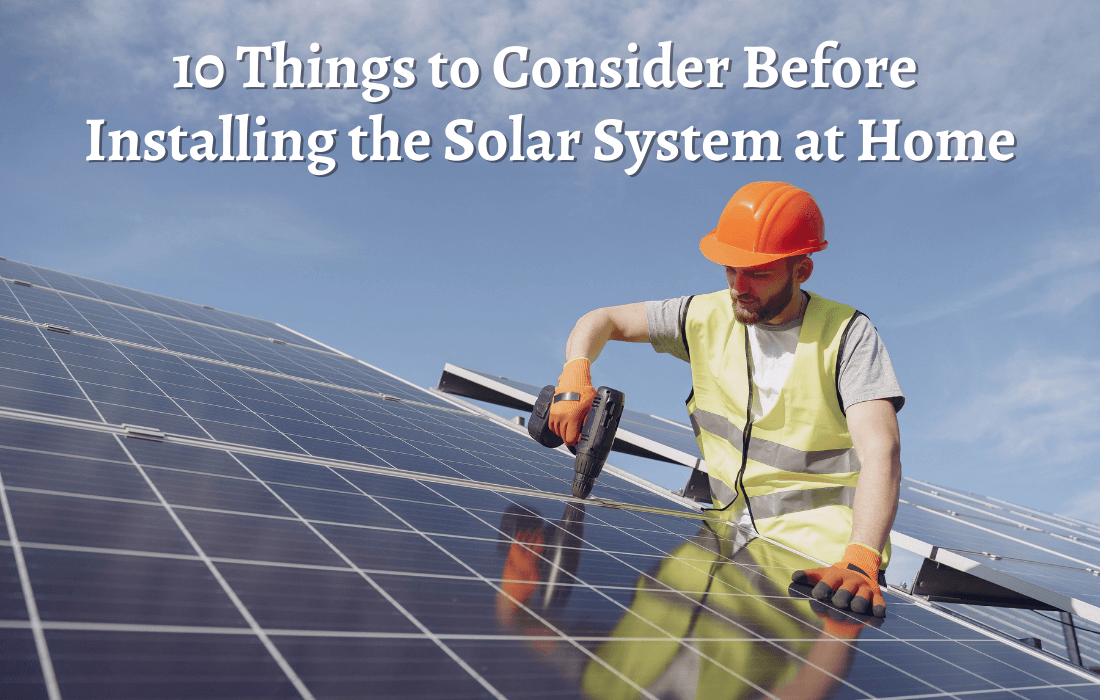The advantage of solar energy adoption by households are well known. Along with promoting a sustainable society, you can also save 80% of your monthly electricity bill with solar energy, which can be a fantastic investment for any homeowner.
If you are a house owner, you are probably already considering adopting solar energy & its benefits. As this is an expensive purchase that you will have to live with for the next 25 years, it is prudent to do extensive research before making any kind of decision.
Here we will answer some important questions that you should know before installing solar solutions at your home. We assure you that this blog with makes your solar journey easy and fruitful:
Can Solar Energy Fulfill 100% Energy Demand of Your Home?
Of course, with a well-designed solar solution, you can generate enough electricity to meet your entire household’s power demand. However, some elements may have an impact on your energy generation capability. Factors like shadow-free roof area, your enchanted load, your electricity consumption & your state’s solar policy, etc. are all to be considered. This is how:
- If the amount of shadow-free area is smaller than the amount of space required to install the number of panels required to supply all of your energy needs, you may have to settle for the low-capacity solar system. In this case, the electricity supplied by your solar system may not be enough to meet your entire household’s needs.
- The installation of home solar systems in most Indian states is limited to less than or equal to the sanctioned load, particularly for on-grid solar systems. If your power demand exceeds your permitted load, you may not be able to cover all of your energy needs with the solar system you install. The good news is that you can ask your DISCOM for a load increase and then install a system that meets your needs.
- If your household energy uses rises drastically after you install a solar solution of a certain size, the energy generated by your system may be insufficient. To address this, you can increase the size of the solar system later while keeping track of your shadow-free roof area, sanctioned load, and your state’s solar policy.
How much can solar help you save on your electricity bill at home?
Monthly savings from solar for a household for electricity users can be as high as 80%, and in certain circumstances even more. However, before ordering your solar system, attempt to calculate your savings in absolute terms as much as feasible. The reason for this is that the saving from solar is dependent on your home’s specific energy profile.
Is your residence allowed for net metering? If so, when should you submit your application?
If you go solar with an on-grid or hybrid solar system, net metering is a critical feature that boosts savings. In exchange for pay, it assists you in exporting the excess electricity generated by your solar system to the grid.
The service is currently offered to homeowners in all Indian states. However, the benefits may vary based on the tariffs imposed by the various states.
You can apply for net metering before or after installing a solar PV system. However, we recommend that you speak to the local DISCOM about the process structure.
How much your rooftop solar system will cost to install?
Solar panels have become significantly less expensive over the last decade. To put it in context, a typical 1 KW solar system that cost around INR 145/WP in 2000 & now costs around INR 35/WP.
However, the actual cost is determined by the quality of the component, the solar installer’s expertise & the project size, because residential solar systems are smaller & the per WP cost is greater than commercial/industrial solar systems due to the lower scale of operations. The goal here is not to compromise with solar component quality or installer experience. Solar Benefits are realized over 25 years, and you don’t want to have a bad experience for short-term gain.
What will the ROI of your solar system be?
You should expect your break-even period to be less than 34 years with a properly configured household solar system. A breakeven period, on the other hand, is determined by the size of the system and the state’s DISCOM tariff rate. The important thing to remember here is that because solar produces savings, the returns are guaranteed. You can use any solar calculator to figure out your expected return on investment and payback direction.
Is your home’s rooftop in a favorable condition to install solar panels?
It is critical to access the longevity of your roofs. The weight of the panels and the mounting components should not be a problem for your roofing. If your roof is shaky, don’t consider going solar until it has been properly repaired. Also, because most Indian residences are placed too close together, make sure that your rooftop is free of any shadows created by surrounding buildings or objects.
Will you be able to deduct your residential solar investment from your taxes?
There are currently no tax breaks available for residential electricity users. However, the savings on electricity bills are high enough to make the investment worthwhile.
Is it possible to relocate your home’s solar panel system?
You can always remove and replace your solar system in a different location. However, the endeavor should be undertaken with caution to avoid causing any damage. Check with your solar installer about the best course of action.
Who should you buy your solar system from for your home?
Throughout the 25 years of your solar adventure, the solar installer will be your partner in crime. As a result, selecting the proper solar installer with whom you can put your trust in times of need is critical. The best place to start is to look for their local and national presence, then their team’s experience, the projects they’ve completed, and their reputation among their stakeholders. Consult with other households who have gone solar.
How can you keep your residential solar system healthy for the next 25 years?
The goal is to provide frequent service and maintenance. Residential solar systems are much smaller and may thus be maintained by the homeowner. However, a service and maintenance package is recommended because it reduces the risk of the job and provides prompt action. Other strategies to ensure the health of your solar system include purchasing premium-grade modules, which are more lasting than standard ones, and purchasing solar insurance, which protects your system against events such as fire, theft, and burglary.


